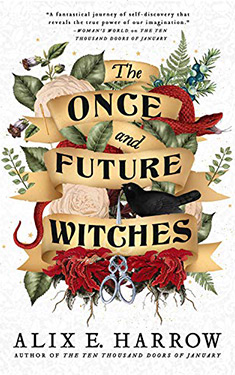Alix E Harrow
Completed 8/6/2021, Reviewed 8/6/2021
4 stars
This is a beautiful book. It takes a look at women’s rights through the eyes of three sisters trying to give a boost to the suffrage movement by introducing witchcraft. It deals with not only the right to vote, but their treatment. It also includes black, lesbian, and trans women in the mix. I was astonished at how much Harrow was able to tackle in this novel. Granted, there were a lot of characters and I lost track of many, but their stories stuck with me. This book has been nominated for a couple of awards this year as of this writing, though not as many as its predecessor, The Ten Thousand Doors of January.
The time is 1893. Three estranged sisters come to be in New Salem. They each have some magic that they learned as nursery rhymes and children’s tale from their late grandmother. One of them accidently makes a tower appear in the middle of town causing uproar amongst its inhabitants and a cry of witchcraft. Witchcraft was supposedly stamped out by a St. George of Hyll, but now seems to be alive and well. This apparition draws the three sisters together. They are of different temperaments and butt heads. However, they begin to come together as the witch hunting craze intensifies and they find that their and many other women’s lives are now in danger.
The three sisters nicely fit into the three archetypes of maiden, mother, and crone. Bella, representing the crone, is a librarian. Agnes is the mother. She’s pregnant and supports herself working in a garment factory. Juniper, the maiden, is brash, wild, and very strong willed. She’s the one who wants to bring witchcraft into the suffrage movement. In the beginning, they fight amongst each other, accusing each other of who betrayed and abandoned whom by leaving the family. Their mother died after Juniper was born and their father was very violent tempered. So there’s a lot to fight about. The character development is very strong, but I didn’t find myself really caring about them until I very far into the book. I haven’t quite figured out why. They are written well and very independent. The one clue might be that all three make a lot of bad choices. I got a little frustrated that they couldn’t see that their decisions might be bad ones, even though time and again, they get in terrible situations.
Fortunately, there are some supporting characters that bring some evenness to their lives. I particularly liked Cleo, the African-American witch who Bella falls for. She was strong and represented the oppressed black community on the outskirts of New Salem, particularly the women’s voices. I also liked August, a man with some magical ability who falls for Agnes despite the scandal that would cause. He was a little too good to be true, but added some positivity to Agnes’ hard life.
I thought the evil wannabe Mayor was very well done. You just loathe him right from the start, and the feeling only grows as the story progresses. He’s the embodiment of a power-hungry, woman-hating man that revels in oppression of the downtrodden.
The prose is really lovely, but I thought that the pacing was too slow. The pacing plus my lack of empathy for the main characters made me occasionally lose focus. When I regained it, I realized I didn’t really miss too much.
I realize I have brought out points that might deter you from reading the book, but there are also so many good things about it. The way Harrow weaves so many issues into the story is quite awesome. It’s not just voting rights, but treatment of workers, race, homophobia, poverty all wrapped up in a tale about witchcraft two hundred years after the Inquisition. I give the book four stars out of five because of this. Not simply because of issues, but how it’s all woven together. And the end did leave me breathless. I just wish I identified with the main characters better.

No comments:
Post a Comment